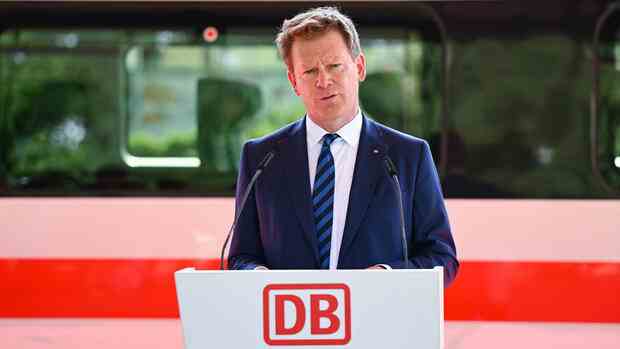Economic operation only plays a “subordinate role” for the railway boss.
(Photo: dpa)
As head of group controlling, today’s head of rail, Richard Lutz, made a lot of contributions to his transport company’s stock market plans for 2008. The aim was to reduce the burden on the federal budget to zero in rail transport, and the cash cow DB Schenker, which was specially purchased for this purpose, was to ensure the necessary inflow of finance together with international business. The Deutsche Bahn board even wanted to spare the federal coffers grants for the network expansion.
15 years and a failed IPO later, Lutz is certain: “We got lost.” The profitability of rail operations, he recently said in a Berlin panel of experts, must now instead play a “subordinate role”. After all, one is “oriented towards the common good”.
The train boss’s mental turnaround is suspiciously similar to the notorious “Pofalla turn”, with which the DB infrastructure board member Ronald Pofalla, who resigned in 2022, wanted to put an end to the chaos of delays on the railways: If a train got out of the timetable, the ex-politician decreed the dispatchers, he turns around in the opposite direction before reaching the terminal station.
The premature change of direction of the railways – apart from numerous customer complaints – have so far brought nothing. And so it should, as is to be feared, end with the 180-degree turnaround of their CEO.
Because for a rail company in Germany, which lives primarily on subsidies from the tax fund and only keeps an eye on efficiency, the side effects would be fatal. Not only the costs would skyrocket unchecked as soon as the primacy of economical management ceased to exist.
The monopoly is threatened
Much worse: Competition from private companies, as Flixtrain is currently trying to do on some long-distance routes, would finally be buried. Even in regional transport, where DB’s private competitors now serve around half of the routes, the state-owned company could regain its former monopoly position through clever cross-subsidization.
It is precisely here that the “common good” that competition on the rails can create is evident. While DB was only 70.1 percent punctual in long-distance traffic, where it almost has a monopoly, in February 2023 it managed 92.6 percent in regional traffic.
One consequence of this is obvious: DB would have to part with its rail network, which, like the road network, is run by the state. On the other hand, strict competition has to prevail on the tracks. Without subsidies.
More: Deutsche Bahn and its customers are threatened with a black year in 2023
